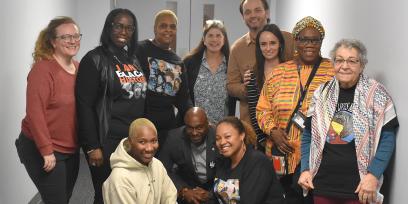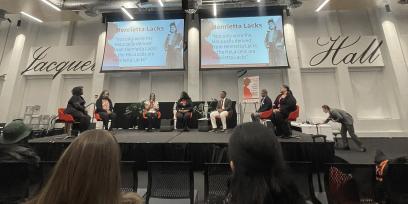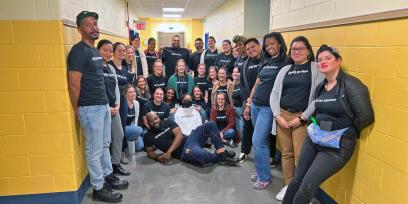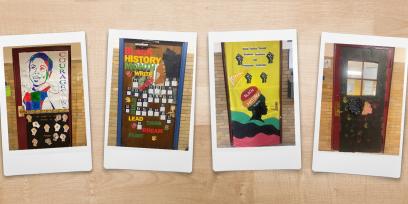A scholarship gala in Chicago. A documentary on race and school policing in Boston. Webinars on anti-racist teaching in Washington, D.C.
AFT affiliates and members across the country celebrated Black Lives Matter at School Feb. 5-9, committing themselves to an annual observance: “a week of action, a year of purpose, a lifetime of practice.” The phrase comes from the national Black Lives Matter at School movement, and those who participate aspire to move their communities toward racial justice.
Black Lives Matter at School operates on four basic demands:
- End zero-tolerance discipline and implement restorative justice.
- Mandate the teaching of Black history and ethnic studies.
- Hire more Black teachers.
- Hire more counselors and fewer police.
The movement also supports 13 guiding principles, and the one highlighted this year is “celebrating and centering collective value.”
Immersed in the movement
Educators can pledge to observe the week of action and the year of purpose, and several AFT affiliates are organizing activities and resources to help.
The Chicago Teachers Union doubled its commitment with two weeks of action: one for educators to prepare, and one to teach the concepts of the movement. Activities include a screening of the film Stamped from the Beginning, based on Ibram X. Kendi’s book exploring the origins of racism; a spades and bid whist house party to raise funds for Bring Chicago Home, an organization addressing homelessness; a scholarship gala; a social gathering for Black Greek-letter organizations and graduates at historically Black colleges and universities; and a “virtual curriculum share” event. There’s also a Google Drive full of Black Lives Matter at School lessons.
All of this is backed up by CTU’s powerful resolution outlining the historical struggle to value Black lives in Chicago schools and resolving to address multiple elements of racial discrimination and injustice.
The Illinois Federation of Teachers has provided a curated collection of learning resources, including many from the AFT’s Share My Lesson (check out SML’s full Black history collection here). Educators can find everything from the origin of the Black Lives Matter movement (as well as an interview with the founders) to explanations of racial profiling and a comprehensive reading list.
The Boston Teachers Union has a year-round committee for Black Lives Matter at School, as well as a committee that promotes ethnic studies. For the Week of Action, the union started with the devastating story of police violence in schools, showing the documentary On These Grounds, and ended on the opposite end of the emotional spectrum with a celebration of joy. Chantei Alves, a BTU kindergarten teacher, was also excited about the door decorating contest she initiated at her school, where one of the requirements was to involve students in the project. She’s been busy teaching about Ruby Bridges—a girl who was exactly the age of her students, 6 years old, when she famously became the first Black child to integrate her elementary school in Louisiana—and introducing them to people like Simone Biles, watching their faces light up when they saw the gymnast’s spectacular floor routine.
Teaching the concepts of Black Lives Matter in school is especially important, says Alves, because “so many of our students, in other spaces in this world, don’t feel like they are celebrated for their uniqueness, for their beauty, for their greatness. It says something when people who look like you or at least understand you are celebrating you and letting you know, ‘I’m standing with you and fighting for you.’”
Like many educators, Alves teaches this love and caring all year long, but she is especially gratified this week as her union steps up to celebrate with her and she proudly wears her BTU Black Lives Matter at School T-shirt. “To be able to wear that shirt with my union’s logo on it, that means a lot to me.”
Working together
Some AFT members of the Washington Teachers’ Union in Washington, D.C., and the Fairfax County Federation of Teachers in Virginia have joined D.C. Area Educators for Social Justice, an initiative launched by Teaching for Change, for a full agenda that includes resources and teaching guides as well as activities throughout the week. There are book lists, video webinars, curriculum guides, toolkits, lessons and more. Events include a Teach the Beat event connecting D.C.’s signature go-go music and Capital City Go-Go, the local NBA G League team, to classroom lessons; an Unapologetically Black Educator Story Lounge event; and an evening of poetry and spoken word.
WTU member Stacie Dunlap describes a long list of activities at Seaton Elementary, where she teaches third grade. Daily announcements highlight people like Alicia Garza, Patrisse Cullors and Opal Tometi, the women who started the Black Lives Matter movement; civil rights leader Bayard Rustin; and educator-activist Mary McLeod Bethune. Teachers have selected books and lessons that match BLM at School principles, and an online map points to local Black businesses that staff and students can support.
“We are in an area where diversity in our school is praised and welcomed, but we have to understand that there are still people on the outside who do not see us as equal,” says Dunlap. Even though D.C. is known as “chocolate city,” the number of African Americans killed by police is high. “I really feel it’s important for the kids to understand that there are inequities that still exist.”
“The goal of the Black Lives Matter at School Week of Action and Year of Purpose is to spark an ongoing movement of critical reflection and honest conversations in school communities for people of all ages to engage with critical issues of social justice,” states the D.C. Area Educators for Social Justice on its website. “It is our duty as educators and community members to civically engage students and build their empathy, collaboration, and agency so they are able to thrive.”
[Virginia Myers]




